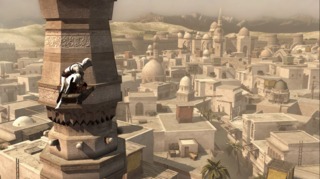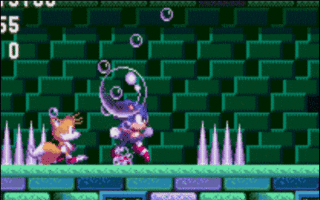
Happy Friday, everybody!
As I mentioned in this week's Off the Clock, at the end of every week I'm going to highlight my favorite responses to the "homework" question I asked at the end of my column. It's also an excuse for us to clock out of the archetypical work week together and catch up a little. (And, you know, for those of us who still have work to do over the weekend, it's still a chance for a little reprieve before things get busy again.)
This week that question was:
Do you have any gaming experiences where, because you shifted your focus/goals, your experience was greatly improved?
There were a lot of great responses this week, so I tried to pick not only my favorite responses, but also entries that represented the general types of replies the question received.
First up is this post by Noblenerf, who not only explains why they play Crusader Kings II the way they do, but also gives a compelling argument for why we should all spend more time with the game.
I really wish I could say "ironman XCOM" but I simply couldn't do it--I broke my self-imposed saving pact because... dammit... it's so tough. So my answer is "puppeteering" in Crusader Kings 2.
Let me explain: in Crusader Kings 2, I don't play to win, but try to roleplay the character I'm dealt. This can mean spending generations in irreverence as they pursue their own mad goals, but ultimately it gives my games a great deal of personality, giving me the room to essentially make storylines and campaigns of my own. (You'd be surprised how much character people in CK2 can have, let alone the dynasties they're members of.) It's a very fun contrast to my cold, mechanical method of playing Europa Universalis 4.
Playing CK2 to win, at least to me, feels like I'm wasting its potential. With all the traits, random elements, and downright bizarre options available, not to mention a lack of Europa's more sophisticated growth/trade/imperial mechanics, it simply isn't as fun to embrace in an identical manner. Don't get me wrong--watching my empire grow is fun, but recapturing it after self-inflicted civil war is even better.
Yes it really, really is. If you're curious about CK2 and haven't ever seen it, check out the video I did with Alex and Vinny a few months ago!
Next up, HeyGuysWhatsUp wrote up their thoughts on enjoying open world games by "treating the worlds as real things."
I usually can't do this for much more than maybe a single play session at a time, but I find that my experience playing open-world games improves when I try to treat the worlds as real things. Obviously people have been doing that sort of things in GTA and Elder Scrolls and the like for a long time, but surprisingly enough I actually really enjoy it in games like Assassin's Creed. As a disclaimer, I'm a crazy person whose favorite Assassin's Creed game is the first one (primarily for the visual design and tone of that game), and have largely not enjoyed it when the series goes for a super light-hearted adventure story (I didn't much care for AC4 and have been enjoying the gameplay of Syndicate but have been skipping the majority of cutscenes).
That said, I was initially having a really tough time getting into AC: Syndicate. I didn't think it looked very different from Unity, and since I wasn't enjoying the story I felt like there was no reason to keep going even though I was enjoying myself while actually playing. However, I got a very stealth-focused mission and decided to try to do it without being spotted at all. After completing the first objective, I had to get to a large building about half a district away, and in a small bit of role-playing I just walked the entire way. Not running, not climbing, just walking through London to my goal. Spending that five minutes strolling through the streets made me notice all the small details on the building I had missed, the incredible lighting engine they have in that game, and even things on my character's clothing I hadn't noticed before. Those moments were probably the most I enjoyed that game.
I sometimes feel like due to the pressure on open-world games to present constant fun (so they can appeal to a large audience and recoup the gigantic development costs) they lose out on the fun of truly discovering a world and not just discovering objectives in that world. I remember that being the thing that made me fall in love with Morrowind at a time when I actually didn't even really know what an RPG was and had no clue how to play that game, which lead to me spending more time just walking than I did doing quests, and probably enjoying it more than I would have otherwise.

HeyGuysWhatsUp definitely hits on some stuff that I've been trying to work out a lot over the last few years regarding open world games, event saturation, and the notion of roleplaying as "meeting a game halfway." Last fall I wrote about how I did this with Watch Dogs, squeezing a lot more out of a game that didn't really have much to offer me. I've also talked about how it's how I play Bethesda games: I try to envision my characters as complete people before they begin their adventure, generally ignore the (lackluster and generalized) backstories set up by the main story, and ignore content that wouldn't be in line with the character I'm playing. (Yes, that means I make new characters to finish out different guild/faction quest lines. In case there was any question, that is the person that I am.)
This post from Macka1080 extends that line of thinking, not only playing a specific game in a less objective-oriented way but also applying it to their desire to "keep up" with game releases:
For me, the most drastic change in my gaming experience came when I finally divested myself of the drive to play all the games, asap. Accepting that I could not keep up with the industry gave me the freedom to play at my own pace, and ever since I've adopted a more lackadaisical approach. In games like The Witcher 3, I spent plenty of time just wandering around the world, basking in sunsets, riding through the rain, and hiking up mountains to enjoy panoramic vistas I would never have seen had I been hewing to the critical path. Sure, it means I'm often way behind everyone else when it comes to new releases, but I feel like I get a whole lot more out of the games I do play when I digest them slowly, thoughtfully, breezily.
There is an incredible diversity in the way people enjoy games, and WrathOfGod's post works as a sort of counterpoint to Macka1080's. In this very personal post, they explain that their arc with games began with treating them as open playgrounds before learning a new way to play.
When I was growing up, the primary way I interacted with games was through watching my father play. It wasn't the way I *most often* interacted with games, but it was the way I... most cared about games. I would play fighting games against him all the time, and I would fool around on my own during all hours, but that was just idle time-wasting until the main event. I just wanted to watch my dad kick some ass. There are, of course, many reasons for this, but the one I'll hone in on is that I vehemently disliked dying in games. States of failure were nothing but stressful and disheartening to me. It was much more enjoyable watching Superhero Dad trounce the villains while I chilled out behind his shoulder.
That aversion to simulated death had an extremely long reach. With rare exception, I would never leave the starting hub in games. I would take in the tranquility of Kokiri Forest and bound around the flat-shaded hills of Peach's Castle, but I wasn't going to venture into Dodongo's Cavern or any water levels where drowning is an ever-disquieting threat. I was content to engage with games mechanically, in a safe or relatively non-threatening sandbox, but the claustrophobia that later, more difficult, and more guided sections of games induce was Too Much for me. I don't think I ever beat a traditionally-structured game until Super Mario 64 came out for the DS (which is a game so docile that it's like eating cotton candy to overcome your fear of habanero peppers). After that, I think the next game I beat was Mortal Kombat: Deception's Konquest mode -- but not the arcade ladder. The deaths come too quickly there. Both of those games were in series I had been messing around in for a decade beforehand, though, and that familiarity helped push me through to the credits.
My time with video games since those breakthroughs had basically been about forcing that door open wider. I starting beating games very occasionally, but not more than maybe one in ten games I acquired? One in fifteen, even? The way I opened that door for good, and I suppose the closest thing to an answer to your question that this comment will have, is I started to keep a log of games that I had beaten. At first, it was just a mental checklist. Usually, I'd tackle game series or sections of a game rather than individual whole games. This gave me a completable and 'necessary' task. I can't play Metal Gear Solid 2 until I beat MGS1, or play Modern Warfare's multiplayer with my friends until I beat the campaign, after all! That consciousness about my weirdo problem, the recognition that I was deliberately fighting against it, evaporated my issue with game deaths.
But behind that issue was a different, separate issue of motivation. Yeah, I COULD beat a game if I wanted to, but God, I have so many games and they all need played and games are long and I could just keep playing Burnout Paradise instead. Divorced from some larger goal, what's the point of beating an individual game? To give it a point, early last year, I started recording beaten games in an Evernote file. The fear of failure had long vanished by now, but this NEW HOTNESS (Evernote. Evernote is the new hotness) addressed my motivation problem. Knowing that I must BEAT THIS GAME in order for it to be 'canonized' in my dumb little notepad was and is enough to get me to complete most games I pick up now. And hey, y'know, seeing a game through to the end is fun. Turns out endings give you closure! Huh!
I still get pangs of anxiety when I hit a game over screen in a game like Dark Souls though. My desire to beat games lead me down a different dark path where I get real irritated at games when I'm not making progress or when a checkpoint throws me 10 minutes back in time. Unless it's a game without progression. Rocket League is just Peach's Castle but with cars, after all.
But still, I feel liberated in a way.

Definitely know what you mean, WrathOfGod. Though I'd also say that there wasn't anything innately weird about the anxiety around not wanting to die in games--I think most people have a similar version of that feeling whenever the Sonic the Hedgehog Drowning Music plays, it's just that you may have been a little more keyed in to that feeling. That said, really glad you reached a place where you're able to enjoy more games and play the way you want to! I'm curious to other people reading, do y'all also keep a "games completed" list going?
In a shorter post, but one that I totally click with, CardCaptorKaren writes about how shifting objectives in racing games makes the experience better:
About adjusting goals, when I got into sim racing games I found I increasingly put less and less emphasis on winning every race and more on getting into fun battles for position. Doesn't matter whether it's for 1st or last usually, if you get to spend the race really being pushed it can produce the kind of story in your head that you end up wanting to tell everyone for several days. That in turn helps me to better enjoy other games where it's more about the journey than the end result.
Figuring this out this year totally transformed Project CARS for me. I was still focused on an objective, it's just that the objective wasn't just "win," it could also be "take that turn a little better.
Finally this week, this post by Dirtyplatinum explains how Minecraft opened them up to a whole new style of aesthetic play:
[Minecraft] was a game that helped open my eyes. There is something that has stuck with me for a bit. I heard it on this site, dont remember from who unfortunately, (It was being quoted from an outsider.) but it was the question "How do I know when I am satisfied?". And while the person was mocked, it kinda dawned on me, Minecraft helped answer that question for me as a gamer. When I first popped on Minecraft, I had the whole "Play to Win" mentality. Seeing games as something to conquer. But when I started way back when the beta released, there was no "winning" Minecraft. There was no Ender Dragon to slay, hell there werent even beds. Yet somehow people where having the time of their life with this game, and it made me a little mad. I wanted that, but how do I get it?
Now I was used to games telling me how to have fun. Some of my first gaming memories were of Streets of Rage and it has an arrow just pointing where to go when you finish beating all the baddies on screen. Minecraft didn't even have so much as a tutorial back then, so I started how everyone should. I punched down some trees, made myself a little dirt house, and simply marveled at the world around me...the directionless, aimless, goalless world around me. And I realized I would have to find my own fun. For a while simply collecting things and figuring out how things worked occupied my time enough. But when I had gathered everything and no longer needed to look at the Minecraft wiki, I was stuck. I mean obviously you build things, but what? I moved out of the dirt hut and into a proper little house. (I called it my cupcake house.) Made a little cellar for storage. But beyond that I just didnt know what to do. So I then realized I would have to change how I was looking at this. Expecting the game to tell me what to do with it to enjoy it wouldn't cut it, I would have to find a way to make my own fun.
And try I did. Starting with the cellar I expanded it to a cave system near my house, making mining a lot easier. Made a dock for fishing. A lighthouse lit by Netherrack. A huge bridge expanding my reach to the surrounding islands. Then I decided I was done with that dinky cave system near my house and built a proper mining station with a proper mine. Then I reasoned that if I am going to spend the time building this stuff I should make it look pretty and cared more about aesthetics. On and on this went. But I realized I had learned something from this game. How to take a game, and have fun with it. Not just the fun that I was supposed to have, but the fun I could find in it. And I carried these lessons with me into future games. Changing the way I looked at sandbox games as a whole and allowing me to have a whole nother level of fun.
I still play Minecraft every now and then, not as much as I used to no doubt, but its a game that will stick with me. Because it helped me answer the question I didnt even know I had ever asked. And that question being...how do I know when I am satisfied?
One of the reasons I love games like Minecraft and Starbound so much is that they can be a chance for players to try out different sorts of creative play. Growing up, I didn't do much decorating or visual designing--it wasn't a thing that was offered to me much as a type of play that was valuable (and yeah, part of that probably because of some gender norms about how boys should and shouldn't play). So when I first came to these sandbox games, I made utilitarian homes because that's all I "needed" to make. But bit by bit... I started having creative ideas, and these games gave me the tools to design them. Next thing you know, I was spending a long ass time decorating my spaceships, co-operatively designing my Minecraft homes, and build basketball courts in Fallout 4.
That's it for the first entry of Clocking Out. Feel free to add your own thoughts about this topic in the comments, or you know, just chat about what you'll be up to over the weekend. And thanks again to those commenters who submitted their thoughts. I really think that you're all helping me to build the second half of my weekly column.